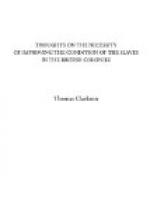I have now to make my remarks upon this account. It shows us clearly how Mr. Steele made a part of his profits. These profits consisted first of a saving of expense in his husbandry, which saving was not made by others. He had his land holed at one-fourth of the usual rate. Let us apply this to all the other operations of husbandry, such as weeding, deep hoeing, &c. in a large farm of nearly eight hundred acres, like his, and we shall see how considerable the savings would be in one year. His Negroes again did not counterfeit sickness as before, in order to be excused from labour, but rather wished to labour in order to obtain the reward. There was therefore no crowding to the hospitals. This constituted a second source of saving; for they who were in the hospitals were maintained by Mr. Steele without earning any thing, while they who were working in the field left to their master in their work, when they went home at night, a value equal at least to that which they had received from him for their day’s labour. But there was another saving of equal importance, which Mr. Steele calls a saving of time, but which he might with more propriety have called a saving of season. This saving of season, he says, was worth more than double the premium; and so it might easily have been. There are soils, every farmer knows, which are so constituted, that if you miss your day, you miss your season; and, if you miss your season, you lose probably half your crop. The saving, therefore, of the season, by having a whole crop instead of half an one, was a third source of saving of money. Now let us put all these savings together, and they will constitute a great saving or profit; for as these savings were made by Mr. Steele in consequence of his new plan, and were therefore not made by others, they constituted an extraordinary profit to him; or they added to the profit, whatever it might have been, which he used to receive from the estate before his new plan was put in execution.




